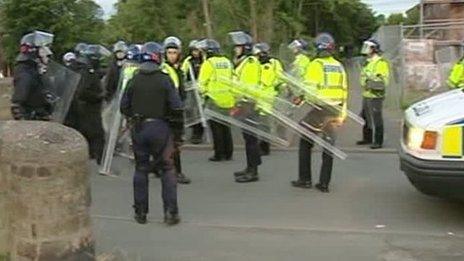Caia Park race riot: 'Big changes' seen in 10 years
- Published
In total, 51 people were charged in connection with the riot, which involved children aged 13
A community leader says lessons have been learned after a race riot on a Wrexham estate 10 years ago.
"Things have changed a lot," said the Reverend James Aylward, chairman of Wrexham Refugee and Asylum Seekers Support Group (WRASSG).
The charity for asylum seekers, which took in Iraqi Kurds caught up in the riot at Caia Park, is to close.
Mr Aylward said it was the right time after a fall in the number of asylum seekers arriving in Wrexham.
Residents who saw a mob attack police said positive changes followed.
A total of 51 people were charged in connection with the disturbances in June 2003, which involved youths as young as 13.
Trouble flared a day after an Iraqi Kurd was set upon by local residents, suffering a fractured skull.
The next night a group of about 20 Iraqi Kurds armed themselves and confronted people inside a pub on the estate, sparking a brawl which spilled into the street.
On the following night violence erupted when police in riot gear were bombarded by a mob with stones and petrol bombs.
A lot of the Iraqi Kurds had already fled homes on the estate having taken refuge in a church hall run by Mr Aylward.
"Things have changed a lot," he said.
"Immediately afterwards there were fears that similar difficulties might arise but things did begin to move."
'Right time'
He said Wrexham council changed its housing policy with the county borough acting as an official dispersal area for asylum seekers as it had housed all the Iraqi Kurds in close proximity within the estate.
Mr Aylward said WRASSG, along with police, the council and other racial equality groups have spent the time since the riot trying to improve relations between asylum seekers and refugees with Wrexham residents.
He says people now tell him they "feel they are well received".
An enduring memory in the aftermath of the riots for Don Kittrick, a former WRASSG member, was the generosity of the people of Wrexham.
He remembers a public appeal led to the charity furnishing 42 flats after the Iraqi Kurds left Caia Park.
"It was the most moving experience of my life," he said.
WRASSG's funding sources stop in September when the charity is expected to shut its shop in the town centre.
"It would seem the right time if we are going to close," he said.
Mr Aylward said the number of asylum seekers arriving in Wrexham has been falling.
Asylum seekers are sent to cities like Cardiff, Swansea and Newport although any community can offer to provide assistance.
The vicar said it was likely Wrexham would stop being an official dispersal area.
Clearsprings, the organisation which acts for the UK Border Agency in housing asylum seekers, declined to comment, saying it was a matter for the Home Office.
A Home Office spokesperson said: "People who claim asylum are dispersed across the UK while their cases are considered.
"They are accommodated according to their individual needs and where there is available and appropriate housing. We continue to disperse a small number of asylum seekers to Wrexham."
Immigration statistics show there were 44 people seeking asylum and living in "dispersed accommodation" in Wrexham between January and March 2013 compared with 58 during the last quarter of 2003.

Then: Riot police called to Caia Park 10 years ago this weekend